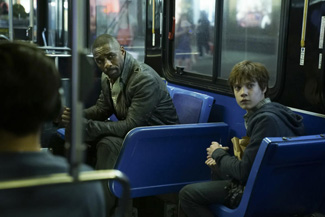|
|
Movie Review: The Dark TowerBy Ben GruchowAugust 10, 2017
This is, in a very real sense, the time frame that Stephen King’s Dark Tower series found itself unlucky enough to be in. The books and stories involved form a Bildungsroman of massive scale, incorporating over 4,000 pages of legacy novels and yet thousands more in short stories and narrative connections of varying impact across several dozen other books. Detail on this will be saved for the Book vs. Movie on the subject, but it’s important to note just how fundamentally huge this thing was in both cinematic potential and liability, and how it defeated J.J. Abrams at Universal and Ron Howard at Warner before ultimately landing at Sony Pictures with Nikolaj Arcel and a budget appropriate for a mid-sized genre one-off and very much not a kick-off to a new cinematic universe. I am not sure there has been a cinematic adaptation quite like this in our lifetimes. Arcel, in conjunction with writers Akiva Goldsman and Jeff Pinkner, has crafted a screenplay combining major events from at least four of the seven source novels and smaller flourishes from God knows how many others, involving dozens of characters, and from it assembled a comically slight 95-minute two-hander: one that whipsaws through every narrative development with speed but no velocity and little momentum, gets all sorts of little grace notes just right while missing most of the major ones by a mile, before crossing precisely the wrong wires in its final act and vaporizing most of its own reason for existence. This is a train wreck, one made with such a visible commitment to the ethic and conceptual hook of its source material that it’s much more frustrating and burdensome to witness than if it just reeked of filmmaking by committee like most doomed adaptations do. The trouble runs deeper here, pointing in the direction of shepherds to a fictional universe who adhere to all of the superficial rules and wrinkles of that universe while somehow losing the core.
|

|
|
|

|
Friday, November 1, 2024
© 2024 Box Office Prophets, a division of One Of Us, Inc.


